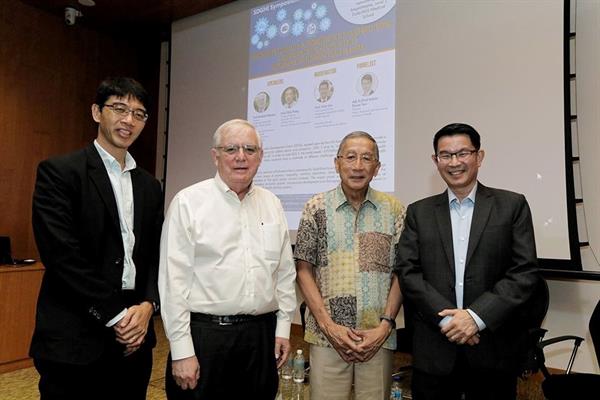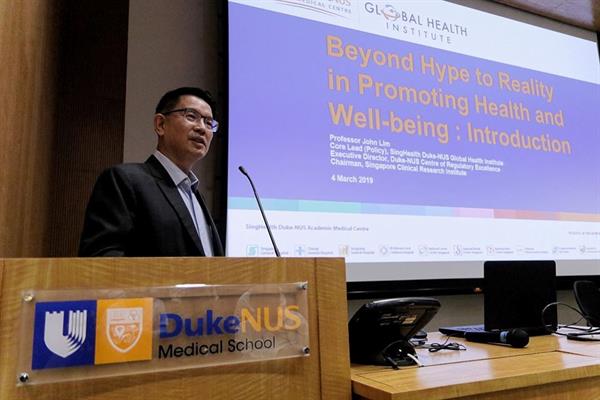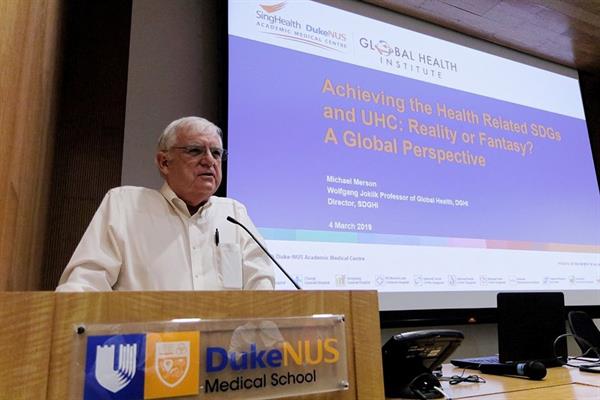Universal health coverage is the focus of World Health Day 2019
Universal health coverage in Singapore balances the advantages of market forces with government intervention to steer them in the right direction to ensure the population has access to quality healthcare.
SINGAPORE, 5 April 2019 – The focus of World Health Day 2019 is universal health coverage (UHC), which means “all people have access to the quality health services they need, when and where they need them, without financial hardship,” according to the World Health Organization. While many around the world do not receive the health services they need, in Singapore, the government balances the advantages of market forces with state intervention ensure the population has access to quality healthcare.
Early in March 2019, the SingHealth Duke-NUS Global Health Institute (SDGHI) held its inaugural policy symposium discussing the progress within Southeast Asia toward meeting the health-related Sustainable Development Goals (SGDs) and UHC. The presentations and discussions at the SDGHI symposium revolved around the challenges of achieving the goals, highlighting the importance of simultaneously addressing the myriad issues beyond the health sector in efforts to ensure the wellbeing of people.
Professor John Lim, Executive Director of the Centre of Regulatory Excellence at Duke-NUS Medical School and Policy core lead of SDGHI, provided an overview of the SDGs, focusing on SDG 3, which aims to “ensure healthy lives and promote well-being for all.” The SDGs, agreed upon by the UN Member States in 2015, provide a shared blueprint for global peace and prosperity. Under SDG 3, SDG target 3.8 is specifically to “achieve universal health coverage including financial risk protection, access to quality healthcare services and safe, effective medicines for all.”
Prof Michael Merson, Director of SDGHI and Wolfgang Joklik Professor at the Duke University Global Health School of Medicine, gave a presentation on the hype and reality surrounding the progress toward achieving the health-related SDGs and UHC. Prof Tikki Pang, Visiting Professor at the NUS Lee Kuan Yew School of Public Policy, shared his perspectives on the regional outlook for achieving the health-related SDGs.
“UHC reaches across the health-related SDGs and is a noble but lofty goal,” remarked Prof Merson on World Health Day. “It requires bold political will and leadership, and substantial country level and global resources. It can only be realized by operating hand in hand with priority communicable and non-communicable disease programs, and with a commitment to long term sustainability and equity.”
The symposium was rounded off with a panel discussion moderated by Prof Lim, and including Prof Merson, Prof Pang and Adjunct Assoc Prof Kelvin Bryan Tan, from Duke-NUS Medical School and Director of Policy, Research and Economics, Ministry of Health Singapore.
 |
From left to right: Adjunct Associate Professor Kelvin Bryan Tan, Duke-NUS Medical School and Director of Policy, Research and Economics, Ministry of Health Singapore; Professor Michael Merson, Director of SDGHI and Wolfgang Joklik Professor at the Duke University Global Health School of Medicine; Professor Tikki Pang, Visiting Professor at the NUS Lee Kuan Yew School of Public Policy; and Professor John Lim, Executive Director of the Centre of Regulatory Excellence at Duke-NUS Medical School and Policy core lead of SDGHI.
(Photo credit: Centre of Regulatory Excellence (CoRE)) |
 |
Professor John Lim, Executive Director of the Centre of Regulatory Excellence at Duke-NUS Medical School and Policy core lead of SDGHI, provided an overview of the Sustainable Development Goals (SDGs) at the SDGHI symposium on 4 March 2019.
(Photo credit: Centre of Regulatory Excellence (CoRE))
|
 |
Professor Michael Merson, Director of SDGHI and Wolfgang Joklik Professor at the Duke University Global Health School of Medicine, gave a presentation on the hype and reality surrounding the progress toward achieving the health-related SDGs and UHC.
(Photo credit: Centre of Regulatory Excellence (CoRE)) |